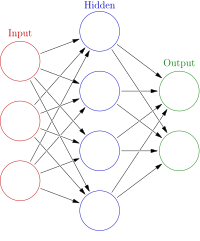
Photo from wikipedia
Neuromorphic computing is considered a promising method for resolving the traditional von Neumann bottleneck. Natural biomaterial-based artificial synapses are popular units for constructing neuromorphic computing systems while suffering from poor… Click to show full abstract
Neuromorphic computing is considered a promising method for resolving the traditional von Neumann bottleneck. Natural biomaterial-based artificial synapses are popular units for constructing neuromorphic computing systems while suffering from poor linearity and limited conduction states. In this work, a AgNO3 doped iota-carrageenan (ι-car) based memristor is proposed to resolve the non-linear limitation. The memristor presents linear conductance tuning with a higher endurance (∼104), more enriched conduction states (>2000), and much lower power consumption (∼3.6 μW) than previously reported biomaterial-based analog memristors. AgNO3 is doped to ι-car to suppress the formation of Ag filaments, thereby eliminating uneven Joule heating. Using deep learning of hand-written digits as an application, a doping-enhanced recognition accuracy (93.8%) is achieved, close to that of an ideal synaptic device (95.7%). This work verifies the feasibility of using biopolymers for future high-performance computational and wearable/implantable electronic applications.
Journal Title: Nanoscale
Year Published: 2022
Link to full text (if available)
Share on Social Media: Sign Up to like & get
recommendations!